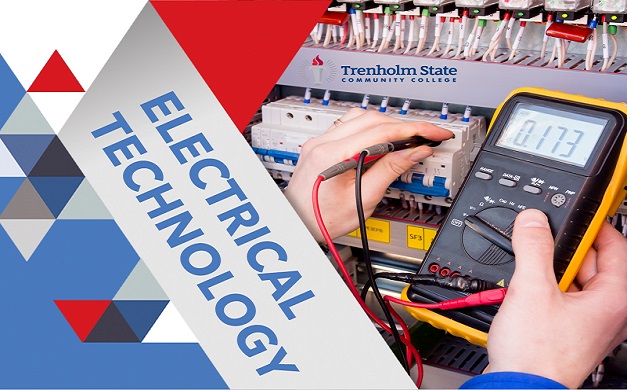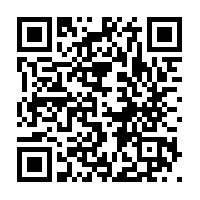
Electrical Technology
Home / PROGRAMS & Training / Career / Technical Ed / Electrical Technology
Department Information
Location:
Patterson Campus:
3920 Troy Highway, Building M
Montgomery, Alabama 36116
Contact:
Phone: 1-866-753-4544
Phone: 334-420-4200

Electrical Technology & Robotics/Mechatronics
The first step to be accepted into this program is to complete the college application. Apply Now!
Program Brochure
Scan or click the QR code to view.

Program Details:
Frequently Asked Questions
Electricians install, maintain, and repair electrical power, communications, lighting, and control systems in homes, businesses, and factories. Electricians typically do the following:
- Read blueprints or technical diagrams
- Install and maintain wiring, control, and lighting systems
- Inspect electrical components, such as transformers and circuit breakers
- Identify electrical problems using a variety of testing devices
- Repair or replace wiring, equipment, or fixtures using hand tools and power tools
- Follow state and local building regulations based on the National Electrical Code
- Direct and train workers to install, maintain, or repair electrical wiring or equipment
Almost every building has an electrical power, communications, lighting, and control system that is installed during construction and maintained after that. These systems power the lights, appliances, and equipment that make people’s lives and jobs easier and more comfortable.
The mission of the Electrical Technology & Robotics/Mechatronics Technology programs at Trenholm State Community College is to prepare individuals to enter and progress in a career as an electrician or instrumentation/ electrician in industrial, commercial, or residential applications.
The Electrical Technology & Robotics/Mechatronics Technology curriculum integrates basic electrical skills and high tech instrumentation for a wide range of industrial employment. The term “instrumentation” refers to instruments used to measure and control manufacturing conversions or treating processes. Knowledge of electricity and process control gives a person a more marketable skill to offer all industries. These fields expand into SMART instruments, PLC/ DCS interface, and AC variable frequency motor controls.
The Electrical Technology program is designed to teach the basic principles of electricity, the National Electric Code, and the safe installation of electrical wiring and equipment. Electrical Technology & Robotics/Mechatronics Technology is designed to teach basic instrumentation for measurement and control in manufacturing. Through the various courses, a student will gain knowledge and practical hands-on experience in both technologies for servicing, troubleshooting and monitoring these systems and equipment.
Awards Available
Associates Degree
- Associate of Applied Science—Automotive/Advanced Manufacturing – Electrical: Residential/Commercial Electrician (74 Semester Hours)
- Associate of Applied Science—Automotive/Advanced Manufacturing – Electrical Technician (74 Semester Hours)
- Associate of Applied Science—Automotive/Advanced Manufacturing – Electrical Instrumentation (73 Semester Hours)
- Associate of Applied Science—Automotive/Advanced Manufacturing – Robotics/Mechatronics (70 Semester Hours)
Certificate
- Automotive/Advanced Manufacturing – Robotics/Mechatronics (59 Semester Hours)
Short Term Certificate
- Automotive/Advanced Manufacturing – Robotics/Mechatronics (28 Semester Hours)
- Automotive/Advanced Manufacturing – Robotics/Mechatronics – Industrial Automation (28 Semester Hours)
- Automotive/Advanced Manufacturing – Electrical: Entry Level Technician (26 Semester Hours)
Curriculum Requirements For Associate Degree
General Education Core Requirements
| Area | Course | Hours Required | Recommended Course(s) |
|---|---|---|---|
| I | Written Composition | 3 | ENG 101 |
| II | Humanities and Fine Arts | 3 | MUS 101 |
| III | Natural Sciences and Mathematics | 6-7 | MTH 116 & PHS 112 |
| IV | History, Social, and Behavioral Sciences | 3 | PSY 200 |
Area V
| Course | Hours | |
|---|---|---|
| Ori 101 | Orientation to College | 1 |
| CIS 146 | Microcomputer Applications | 3 |
| ADM 111 | Manufacturing Safety Practices . | 3 |
| ELT 104 | Distribution Systems | 3 |
| ELT 108 | DC Fundamentals | 3 |
| ELT 110 | Wiring Methods | 3 |
| ELT 112 | Concepts of Alternating Current | 5 |
| ELT 114 | Residential Wiring Methods | 3 |
| ELT 117 | AC/DC Machines | 3 |
| ELT 118 | Commercial/Industrial Wiring | 3 |
| ELT 119 | Concepts of Solid State Electronics | 5 |
| ELT 121 | Concepts of Digital Electronics | 5 |
| ELT 209 | Motor Controls I | 3 |
| ELT 212 | Motor Controls II | 3 |
| ELT 231 | Programmable Controls I | 3 |
| ELT 232 | Advanced Programmable Controllers | 3 |
| ELT 234 | PLC Applications | 3 |
| ELT 286 | Co-op | 1 |
| MTT 147 | Intoduction to Machine Shop | 3 |
| TOTAL: | 74 | |
Tuition & Fee Schedule
You can find tuition rates on our Tuition & Fee schedule
Important Dates
Refer to the College Calendar for all important dates.
ACCUPLACER Testing
The answer is yes, unless you qualify for exemption.
Potential Salary Range
The median annual wage for electrical and electronics engineering technicians was $66,390 in May 2022. The lowest 10 percent earned less than $43,930, and the highest 10 percent earned more than $101,480. Source: Bureau of Labor and Statistics Occupational Outlook Handbook, 2023 Survey
Contact Us
Program Contact
Edward Abrasley
Program Coordinator/Instructor
eabrasley@trenholmstate.edu
Location
Patterson Site, Building M
3920 Troy Hwy,
Montgomery, AL 36116
Detailed Directions



